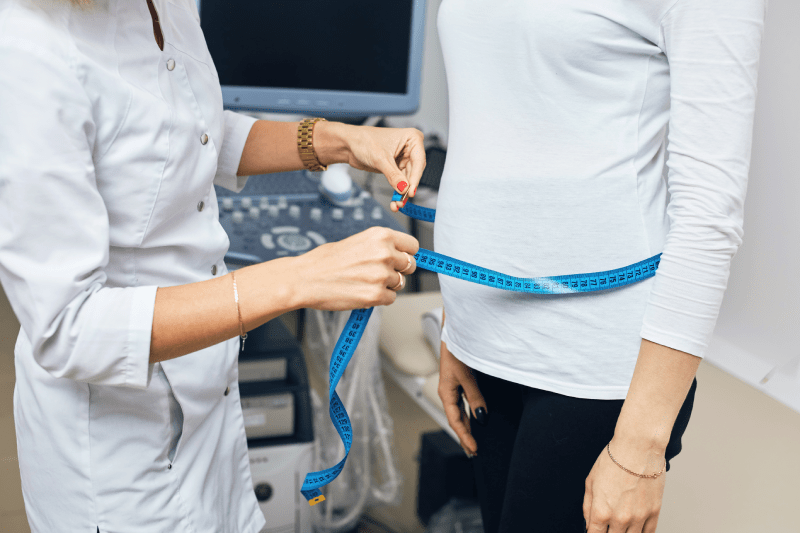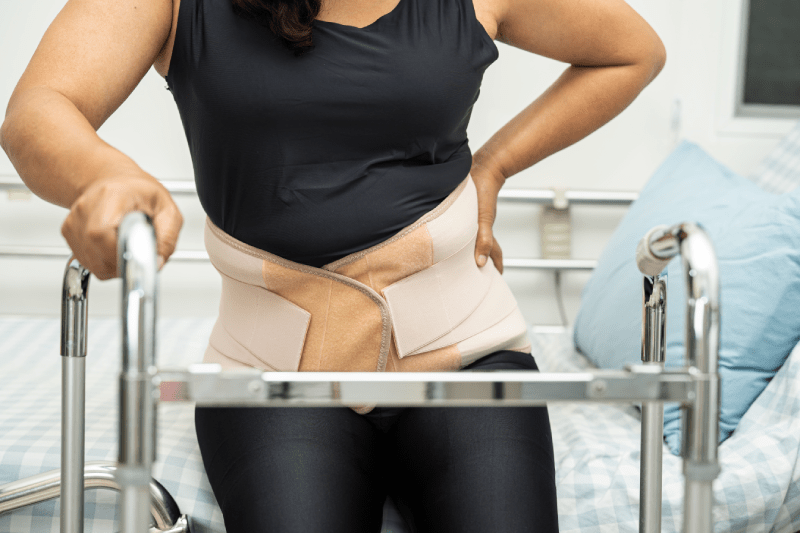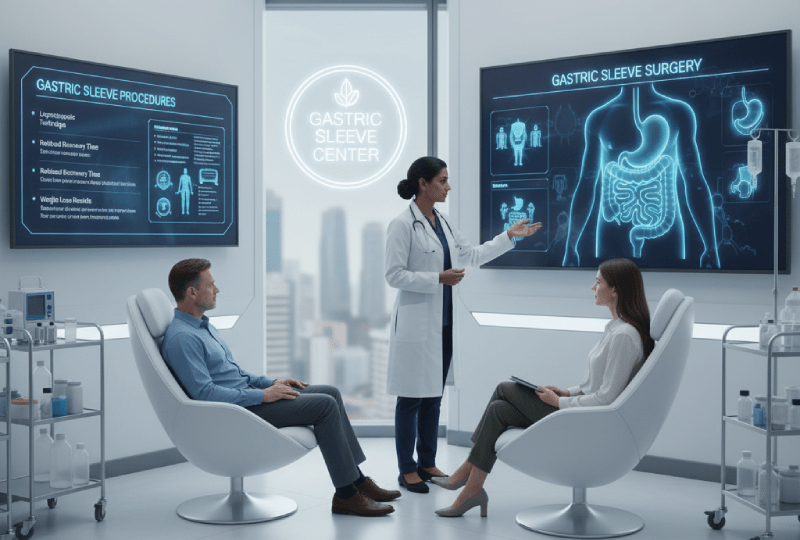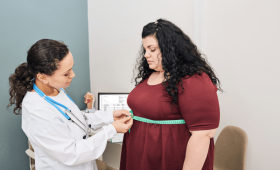What Exactly is Gastric Sleeve Surgery and What Kind of Procedure is It?
Gastric sleeve surgery is a procedure that involves the surgical removal of approximately 75-80% of the stomach. The remaining stomach forms a thin tube, shrinking to about the size of a banana. This operation fundamentally changes the body’s food intake in two ways: Firstly, by drastically reducing the stomach’s volume, it allows patients to feel satisfied with significantly less food.
Secondly, and more importantly, it aids in appetite control by substantially reducing the production of ghrelin, the hormone known as the hunger hormone. The surgery is typically performed using a minimally invasive laparoscopic, or “keyhole,” technique with small incisions. This modern method allows patients to experience less pain, shorter hospital stays, and a much faster return to their daily routines compared to traditional open surgery. A successful surgical operation is the first and most crucial step toward long-term healthy weight loss.
Who is a Suitable Candidate for Gastric Sleeve Surgery?
Gastric sleeve surgery is generally suitable for individuals who meet specific clinical criteria, primarily encompassing those with a Body Mass Index (BMI) of 40 and above. It is also frequently recommended for candidates with a BMI between 35 and 40 who have serious weight-related health problems, such as uncontrolled Type 2 diabetes, chronic high blood pressure, or severe obstructive sleep apnea.
Ideal candidates must demonstrate that they have attempted and failed to lose weight using traditional methods (such as structured diet programs and regular exercise). The most critical point is the mandatory exhibition of a strong psychological commitment by patients to adopt significant and lasting lifestyle changes after surgery to ensure success in long-term weight management.

What Are the Potential Risks of Gastric Sleeve Surgery?
As with any major surgical intervention, gastric sleeve surgery carries certain potential risks that must be handled and managed with care. These risks include general surgical risks such as post-operative infection at the incision sites, excessive bleeding during or after the procedure, and complications related to the use of general anesthesia.
The most critical and specific risk is the potential development of a gastrointestinal leak or fistula along the new stomach staple line, a condition that requires urgent medical intervention. However, these risks are significantly minimized when procedures are performed in modern hospitals in Turkey by highly experienced surgical teams following strict international safety protocols. Patients’ diligent adherence to all pre- and post-operative instructions is the single largest factor in successful risk management.
How Long Does the Recovery Process Take After Gastric Sleeve Surgery?
The recovery process begins immediately after surgery, and patients typically remain under supervision in the hospital for 3 to 5 days to monitor for possible early post-operative complications and manage initial pain. Strict adherence to a phased liquid and subsequent pureed diet during the first few weeks after discharge is a fundamental requirement for the proper healing and adaptation of the new stomach pouch.
Most individuals find they can gradually return to light, non-strenuous work activities within 1 to 3 weeks, although this duration varies depending on the physical demands of their jobs. While achieving full energy levels and the maturation of all internal and external wounds may take several months, the first four weeks remain the most critical period for structured recovery and nutritional compliance.
What Are the Long-Term Success Rates of Gastric Sleeve Surgery?
The long-term success of gastric sleeve surgery is measured not only by the amount of excess weight lost initially but also by how sustainably the patient maintains this result. Patients tend to lose an average of 60% to 80% of their excess weight within the first 12 to 18 months after surgery. Success rates are quite high, with the potential to maintain sustainable weight loss above 80% especially over a 5-year follow-up period. However, the fundamental secret to this long-term success lies in the patient viewing the surgery not as a “magic wand,” but as a powerful tool that encourages a permanent lifestyle change. Regular follow-up appointments, continuous nutritional counseling, and physical activity play a key role in maintaining success.
How to Adapt to the New Lifestyle After Surgery?
Gastric sleeve surgery is merely a starting point that the patient should view as a powerful tool; achieving and maintaining permanent weight loss is strictly dependent on a commitment to profound and lasting lifestyle transformation. Post-operatively, patients must fundamentally restructure their eating habits, which involves consistently consuming very small portions, chewing all food thoroughly to aid digestion, and avoiding the habit of drinking liquids simultaneously with meals to prevent discomfort and overfilling.
Furthermore, the mandatory, lifelong use of regular vitamin and mineral supplements is essential to prevent nutritional deficiencies. Integrating regular physical activity and exercise into the daily routine is also an absolutely integral and non-negotiable component of successfully adapting to this new, healthier lifestyle.
Is Gastric Sleeve Operation a Reversible Procedure?
Gastric sleeve (Sleeve Gastrectomy) operation is considered an irreversible procedure because a large portion of the stomach is permanently removed. This means the stomach cannot be restored to its previous volume. However, in cases where some patients regain weight years later or develop complications like acid reflux, the gastric sleeve surgery can be converted into another type of bariatric surgery. For instance, the stomach can be converted from a sleeve to a gastric bypass. These conversion procedures are designed to assist the patient with weight loss and address underlying health issues. Therefore, the decision for surgery should be made carefully, considering the permanent nature of the results.
What Medical Preparations and Tests Are Required Before Surgery?
A comprehensive and mandatory pre-operative evaluation process is essential to ensure patient safety and the best possible outcome. This comprehensive assessment includes detailed consultations with a multidisciplinary team of specialists, including cardiology for heart health, pulmonary specialists for respiratory function, psychiatry for mental readiness, and internal medicine specialists for overall systemic health.
Additionally, a battery of detailed diagnostic tests must be performed, such as comprehensive blood panels to check organ function, an endoscopy to examine the upper gastrointestinal tract, and an abdominal ultrasound. These extensive preparations and screenings are of vital importance to confirm the patient’s full medical suitability for the surgery, thereby establishing the foundation for the procedure to be carried out with maximum safety and confidence.

What Are the Age Limits and Criteria in Obesity Surgery?
The general age range for obesity surgery is typically accepted as between 18 and 65 years, though these limits may show flexibility depending on the patient’s general health status and the expert surgeon’s evaluation. In adolescents under the age of 18, surgery is only considered in extremely rare cases and with the joint approval of multiple specialties (pediatrics, surgery, psychology), especially if severe co-morbidities are present.
For patients over 65, although surgical risks increase with age, the operation may be performed to improve quality of life if the patient’s biological age and general health condition are deemed suitable. The important point is that age is not just a number but a criterion for assessment that carefully balances the risks and potential benefits.
Why is Post-Surgery Nutritional Counseling of Vital Importance?
Post-gastric sleeve nutritional counseling is indispensable for the long-term sustainability of surgical success. Since the stomach volume is reduced, it is essential for patients to make correct food choices, consume nutrient-dense foods, and particularly focus on protein intake. The dietitian teaches the patient how to safely navigate the gradual dietary transitions after surgery (from liquids to purees, from pureed foods to soft solids, and eventually to solid foods).
Furthermore, they provide continuous guidance in establishing new lifelong habits, such as adhering to small portions, techniques for chewing food thoroughly, and avoiding drinking liquids simultaneously with meals to maintain hydration. Without this counseling, patients may face the risks of stretching the stomach, malnutrition, or weight regain.
What Vitamin Supplements Are Mandatory After Bariatric Surgery Treatment?
After gastric sleeve surgery, due to a slight reduction in the absorptive parts of the stomach, it is absolutely mandatory for patients to take regular vitamin and mineral supplements for life to prevent nutritional deficiencies. The most critical supplements include Vitamin B12 (often in injection or sublingual form), Vitamin D and Calcium (to maintain bone health), Iron, and Folic Acid (to prevent anemia). Most patients also typically use a multivitamin complex. The dosage and type of these supplements must be determined based on the patient’s blood test results and the dietitian’s individual assessment, and their uninterrupted use is vital for long-term health.
What Psychological Changes Can Develop After Surgery?
Gastric sleeve surgery initiates not only physical but also a major psychological transformation that fundamentally changes the patient’s relationship with food, social life, and self-perception. While patients may initially experience great excitement and increased self-confidence from rapid weight loss after surgery, they may also face difficulties coping with the removal of “emotional eating” mechanisms, pressure to eat in social settings, and adaptation issues due to rapid changes in body image. Some patients may experience depression, anxiety, or food obsession during this process. Therefore, receiving psychological support and counseling before and after surgery is vital for managing these challenging emotional transitions and achieving a healthy mental state.
What Are the Most Important Steps for a Successful Weight Maintenance Process?
The true success of gastric sleeve surgery is measured by the long-term maintenance of the weight lost after the initial rapid weight loss phase. The most important steps for a successful weight maintenance process must be a continuous part of nutrition and lifestyle. It is essential for the patient to incorporate at least 30 minutes of regular physical activity (brisk walking, swimming, light weightlifting) into their routine daily. Adhering to regular check-up appointments with the lifelong dietitian and bariatric surgical team is critical for detecting even small deviations at an early stage. Finally, developing the consciousness of emotional stress management and avoiding the use of food as a coping mechanism forms the foundation of permanent success.
Why Has Turkey Become an International Center for Obesity Surgery?
Turkey has rapidly gained international recognition and prominence as a leading center for obesity surgery; the main reason is that it offers exceptionally high-quality healthcare services that meet or exceed the strict medical standards of Europe and North America, but at significantly more accessible costs.
This competitive pricing is supported by other strategic advantages such as Turkey’s convenient geographical location, which allows easy access for patients from multiple continents. The country boasts a rapidly growing infrastructure of modern, state-of-the-art hospitals, further strengthened by supportive government policies that actively promote medical tourism. Crucially, a large number of Turkish surgical teams have gained extensive international experience and hold multiple global certifications, making them highly reliable practitioners for international patients.
What is the Average Cost of Gastric Sleeve Surgery in Turkey?
The total cost of gastric sleeve surgery across Turkey varies widely, depending on the scope of services and the quality of the hospital. On average, a fully comprehensive gastric sleeve package, including hospital fees, surgical equipment (staple lines), anesthesia, medication, and hospital stay, can cost between 3,500 Euro and 7,000 Euro. This pricing is due to the country’s lower general cost of living and exchange rate advantages, which means it amounts to only a fraction of the cost for the same quality procedure in Western Europe or the US. The hospital’s international accreditation level and the extent to which the package covers additional services such as accommodation and transfers are decisive factors in determining the cost.

What Are the Main Factors Affecting the Cost of Gastric Sleeve in Turkey?
The factors affecting the total cost of gastric sleeve treatment in Turkey are formed by a combination of complex variables that extend far beyond the operating room fee. Key determining factors include the brand and quality of the surgical stapling devices and the origin of the consumables used, which are of great importance. Additionally, the hospital’s international accreditation status (e.g., JCI), the level of advanced technological infrastructure it employs, and the economic region where the operation is performed also have an impact on the cost. Pricing is significantly affected by whether essential supportive services such as accommodation, airport and hospital transfers, 24/7 medical interpreter access are included in the package’s scope, and by the proven skill and experience of the performing surgical team.
How Does Hospital Quality and Pricing Vary in Istanbul?
Istanbul is the city where obesity surgery is most intensively performed in Turkey and where the most advanced hospitals are located. Hospitals in the city follow different pricing strategies based on the quality of service they offer, their central locations, and their technological equipment. Facilities located in the central districts of Istanbul or in international chain hospitals with accreditations like JCI generally charge higher prices, but in return, they offer the latest medical devices and the most experienced surgeons. The price increases in direct proportion to the hospital’s luxury level, private room comfort, and the variety of additional services included in the package, thus creating a wide range of options to suit patients’ budgets and comfort expectations.
Should Flight and Accommodation Services Be Included in Package Prices?
The inclusion of robust logistical support in the package is the greatest inherent advantage of comprehensive health tourism packages, as this support extends far beyond just medical services. When a package thoughtfully encompasses comfortable accommodation, reliable airport and hospital transfers, and crucially, access to a professional medical interpreter available 24 hours a day, the overall experience for international patients becomes significantly more seamless and stress-free. This level of organized support is highly valuable, particularly because it allows patients coming from abroad to manage the entirety of their process in Turkey (from arrival to departure) with maximum comfort and minimum anxiety, enabling them to focus completely on their recovery and well-being.
What is the Experience Level of Healthcare Personnel in Turkey?
Turkey possesses a highly skilled, motivated, and continuously expanding workforce of young and dynamic healthcare professionals. A significant number of Turkish surgeons specializing in bariatric procedures have successfully completed extensive international training programs and have gained vast experience by performing hundreds of complex bariatric operations. This level of expertise is often reinforced by their significant contributions to international scientific publications, thereby proving their global reliability. This collective wealth of experience and commitment to international standards solidify Turkey’s reputation as a highly reliable and attractive destination for international patients seeking specialized, high-quality medical procedures.
How is the Language Barrier Overcome During the Treatment Process?
The most successful and reputable health tourism companies effectively eliminate potential communication difficulties by mandatorily including professional medical interpreters in their treatment packages. These interpreters are not only fluent in English or the patient’s native language but also possess specialized knowledge of medical terminology. Their role is to ensure that communication between the patient and all medical personnel, including doctors and nurses, is clear, precise, and continuous at all critical moments. Serving as a knowledgeable cultural and linguistic bridge, these interpreters play a fundamental role in helping international patients feel completely secure, understood, and comfortable throughout their entire medical journey in Turkey.
What Are the Standards for Post-Surgery Follow-up and Care in Turkey?
Modern hospitals in Turkey implement rigorous post-surgery follow-up and care standards to secure the long-term health of international patients. These standards include providing detailed written and verbal instructions for wound care and pain management in the first few days after discharge from the hospital. Additionally, most bariatric centers facilitate regular virtual consultations with dietitians and coordinators even after patients return to their home countries. This remote follow-up system is critical for ensuring that the patient is correctly transitioning through the dietary stages, regularly taking vitamin supplements, and that any early signs of possible complications are quickly detected.
Which Season is the Most Ideal for Treatment in Turkey?
Although gastric sleeve surgery can safely be planned and performed throughout any period of the year, the spring (typically April to June) and autumn (September to November) months offer the most ideal conditions for international patients. These seasons are preferred because they allow patients to spend their post-operative recovery periods in greater comfort, benefiting from mild and pleasant weather conditions that are perfect for light, therapeutic outdoor walks. Furthermore, these moderate temperatures are more conducive to exploring the beautiful Turkish surroundings without the strain of intense summer heat, thereby providing the peaceful and restful environment that is absolutely essential for both physical and mental recovery during the post-operative phase.
How Do Prices in Turkey Compare with European and US Prices?
The prices for gastric sleeve surgery in Turkey, without compromising on quality, are generally 50% to 70% lower compared to equivalent procedures in Europe, and significantly lower than costs in the US. For example, the cost of a high-quality surgical package in Turkey may not even cover the hospital fees alone in the West for the same procedure. This large price advantage stems from the lower general operating costs, personnel expenses, and exchange rate advantages provided to international patients in Turkey. This economic benefit allows patients to make significant savings even after covering the costs of flights and accommodation.
What Documents Should Be Prepared Before Coming to Turkey?
When international patients prepare to travel to Turkey for their medical procedure, they need to have certain key documents ready for a smooth journey and admission. These mandatory documents typically include a valid passport that meets international travel requirements, detailed medical reports that comprehensively outline their health history and any previous treatments, and the most recent test results confirming their current physical and medical suitability for the planned surgery. The Cure Holiday coordination team plays a supportive role, offering clear guidance and assisting the patient with the often-complex process of gathering, organizing, and properly preparing all the required essential paperwork and documentation.
How is the Pre-Surgery Diet and Preparation Process Followed in Turkey?
A crucial, mandatory special diet is carefully prescribed and must be rigorously followed in the period immediately preceding the surgery. The primary clinical purpose of this preparatory diet is to safely reduce the size and fat content of the liver, a vital step that significantly enhances the safety and technical feasibility of the surgical procedure. Cure Holiday provides ongoing guidance and close monitoring for this preparation diet by facilitating regular, scheduled online consultations with dedicated, experienced dietitians. This proactive, remote oversight ensures that patients correctly adhere to the nutritional requirements, maximizing the clinical preparation for a successful and safe operation.

How Many Days Is Ideal to Stay in Turkey After Gastric Sleeve Surgery?
To ensure the highest level of patient safety and peace of mind, it is generally and strongly recommended that patients allocate a total duration of 7 to 10 days for their stay in Turkey following the gastric sleeve procedure. This recommended time frame is designed to provide sufficient opportunity for the surgical team to confirm that the operation has been safely and successfully completed and, crucially, that the most significant risks associated with possible early complications have effectively passed. This total period thoughtfully incorporates both the necessary stay in the hospital for acute care and the subsequent essential time dedicated to resting and gentle recuperation at the comfortable accommodation facility prior to undertaking the flight home.
Could There Be Extra Hidden Fees During the Stay in Turkey?
The potential risk of encountering unexpected or hidden charges is substantially mitigated when patients consciously choose to collaborate only with reliable and entirely transparent health tourism providers like Cure Holiday. A professionally designed package should clearly and comprehensively encompass all essential services, typically including the cost of anesthesia, necessary medications, all standard hospital expenses, organized transfers, and specified accommodation where applicable. Any potential for additional charges would arise exclusively from discretionary, personal out-of-pocket expenses beyond the package’s scope or, in very rare and unfortunate circumstances, from the costs associated with managing unforeseen and unexpected medical complications that fall outside the standard protocol.
How Are Emergency Situations and Complication Management Handled in Turkey?
International accredited hospitals in Turkey have advanced protocols for emergencies and complications that may arise after bariatric surgery. These protocols include rapid diagnosis and surgical revision capacity in cases of leaks (fistula) or bleeding that require urgent intervention. Intermediary agencies like Cure Holiday manage this process with 24/7 accessible support lines for patients and logistical plans to ensure the patient’s rapid transfer to the hospital in an emergency. Furthermore, the immediate availability of medical interpreters in emergencies is guaranteed so that patients can communicate in their native language, minimizing patient stress.
Why Should Cure Holiday Be Chosen for the Gastric Sleeve Surgery Journey?
The foremost compelling reason for choosing Cure Holiday for gastric sleeve surgery lies in their comprehensive approach, which extends far beyond the technical execution of the surgical procedure itself. Cure Holiday is purposefully dedicated to delivering a holistic treatment experience that critically prioritizes not just the quality of the surgical service but also the absolute comfort, overall safety, and profound peace of mind of the patient during the entire delicate recovery process. By collaborating exclusively with expert teams who adhere to the highest ethical values, Cure Holiday meticulously manages every step of the patient’s journey in Turkey, providing continuous support from initial contact right through to their final departure.
What Comprehensive Services Do Cure Holiday Packages Include?
Cure Holiday’s thoughtfully designed packages are constructed to be comprehensive, ensuring that patients receive maximum value and support. These offerings typically encompass all mandatory pre-operative diagnostic tests and evaluations, the surgical operation expertly performed by a seasoned surgical team, the essential duration of the hospital stay, all required medications and surgical consumables, smooth airport transfers upon arrival and departure, and comfortable, carefully selected accommodation situated conveniently. Crucially, access to professional, high-quality medical interpretation services is consistently provided and forms a non-negotiable and integrated element of every treatment package they offer.
How Is Transparency in Pricing Ensured with Cure Holiday?
Cure Holiday is committed to providing full transparency in gastric sleeve costs. In the price quotations offered to patients, all items included and not included in the package (such as the brand of stapler used, anesthesia, medications, number of accommodation days) are listed in detail. To completely eliminate the concept of “hidden fees,” all additional costs the patient may potentially face (for example, the fee for a rarely necessary additional surgical consultation) are explicitly stated in advance. This transparent policy allows patients to manage their budgets clearly and start treatment with complete confidence, thereby minimizing stress arising from financial uncertainty.
Is Cure Holiday a Licensed Health Tourism Agency?
Cure Holiday operates as a licensed and authorized health tourism agency, fulfilling all legal requirements set by the Ministry of Health of the Republic of Turkey. This legal status guarantees that patients receive their treatment within a reliable, officially supervised framework. Being a licensed agency means that the quality of service, ethical standards, and the protection of patient rights are regularly controlled by the state, which is one of the most important trust indicators for international patients, confirming that the quality of care is externally audited.
How Are Pre-Surgery Preparations Managed by Cure Holiday?
Cure Holiday meticulously manages pre-surgery preparations as one of the most critical steps in the patient’s medical journey. The team initiates a detailed pre-assessment process regarding the patient’s health history and current status even while they are still in their home country. Upon arrival, Cure Holiday takes responsibility for organizing all necessary transport logistics, efficiently managing all hospital admission and discharge protocols, and maintaining close monitoring throughout the patient’s hospital stay. Furthermore, patients benefit from the reassurance of a 24/7 accessible support hotline throughout their entire recovery period, ensuring they can focus completely on their healing journey without external administrative worries.
How Is Post-Surgery Pain Control and Management Provided?
Since gastric sleeve surgery is performed using the minimally invasive laparoscopic method, it is typical for the patient to experience considerably less post-operative pain compared to traditional open surgical techniques. Throughout the hospital stay, a dedicated nursing team ensures that the patient’s pain levels are continuously and effectively controlled through the timely administration of strong, appropriate painkillers. Upon safe discharge, the patient receives comprehensive and detailed verbal and written instructions regarding the necessary medications they must take at home. This proactive and well-managed approach to pain control is fundamental to ensuring that the patient’s crucial early recovery phase is completed with the minimum possible level of physical discomfort.

What Is Cure Holiday’s Long-Term Health Follow-up System Like?
Post-operative follow-up is absolutely vital for guaranteeing the long-term success of the patient’s weight loss journey, and Cure Holiday has established a detailed system for this purpose. Even after patients have successfully returned to their home countries, Cure Holiday facilitates regular, structured virtual check-ups with both expert dietitians and dedicated program coordinators. These planned follow-up sessions are designed to provide continuous motivation, answer emerging questions, monitor progress effectively, and proactively offer necessary support and guidance, thereby ensuring that the long-term changes required for sustained success are firmly established and maintained over time.
How Are Accommodation and Transfer Plans Made for Cure Holiday Patients?
Cure Holiday offers dedicated support and guidance to its international patients for making secure and comfortable flight and travel arrangements. This assistance includes providing advice on flight booking options and meticulously planning airport transfers to ensure a seamless transition upon arrival. Patients receive crucial information and detailed instructions regarding all necessary health precautions that must be taken to ensure flight safety, particularly concerning post-operative recovery and the risk of blood clots. The core aim of this organized planning is to guarantee that the patient’s entire journey to and from Turkey is characterized by comfort, minimal stress, and the utmost attention to their safety and medical needs.
How Can Information About the Experience of Cure Holiday’s Medical Team Be Obtained?
Cure Holiday maintains a high degree of transparency regarding the credentials and extensive experience of the medical teams they partner with. They readily share detailed information concerning the general professional background of the surgical teams, their specific areas of specialization within the field of bariatric surgery, and verified data on the high number of successful operations they have performed. By operating with this open information policy, Cure Holiday confidently guarantees that all partnering medical teams adhere strictly to international procedural standards and best practices. This transparent approach allows prospective patients to make highly informed decisions based on confirmed expertise and established reliability, building trust in the quality of care they will receive.
How Can I Get a Personalized Treatment Plan from Cure Holiday?
Getting a personalized treatment plan from Cure Holiday is extremely simple. The patient must first fill out a pre-application form via their website or communication channels and share their existing medical history (blood tests, etc., if available). This initial contact allows the coordination team to understand the patient’s needs, expectations, and medical suitability. Subsequently, a personal coordinator is assigned, and a detailed briefing on the entire treatment process, along with a price quote specifically tailored to the patient’s goals and budget, is rapidly initiated. This simple starting step ensures that the patient can easily integrate into the entire treatment process.
Can Places to Visit in Turkey Be Planned After Treatment with Cure Holiday?
Yes, absolutely, the possibility of integrating local exploration into the trip exists, but it is strictly subject to successful completion of the surgery and a secure, initial recovery period. Once the medical team confirms that the patient’s energy levels are stable and sufficient, Cure Holiday can actively assist in thoughtfully planning appropriate excursions. These planned activities are typically light cultural trips or gentle explorations focused on discovering the accessible historical sites and natural beauty spots within the surrounding area. All planned activities are carefully tailored to match the patient’s current physical energy level, ensuring that the exploration remains a positive and non-strenuous addition to their healing journey.
What Makes Cure Holiday’s Patient Support Exceptional?
The factor that makes Cure Holiday’s patient support exceptional is that its services are uninterrupted 24/7, personalized, and multilingual. The team stands by the patient throughout this entire journey, from the moment they decide on treatment, to their flight to Turkey, the surgery and recovery process, and even during the monthly follow-ups after returning home. The support covers not only medical aspects but also logistical, cultural, and psychological comfort. The assurance that patients can reach a coordinator at any time and have their concerns addressed instantly is the fundamental feature that elevates this support above a standard tourism service and ensures the patient feels secure.
Why is Gastric Sleeve Surgery with Cure Holiday a Transformation Journey?
Engaging in gastric sleeve surgery with Cure Holiday represents much more than simply undergoing a purely physical medical procedure; it symbolizes a profound and life-altering opportunity for the patient to decisively “rewrite” their life narrative and health future. Cure Holiday recognizes the emotional weight of this transformation and commits to standing beside the patient throughout this entire journey. They provide comprehensive, unwavering support that includes not just exceptional medical care, but also crucial elements like instilling confidence, providing a serene environment for peace of mind, and ensuring maximum comfort, thereby facilitating a holistic transition towards a radically healthier and more fulfilling existence.
What Is the First Step to Start the Process with Cure Holiday?
The first step to starting gastric sleeve treatment with Cure Holiday is to fill out a pre-application form via their website or communication channels and share their existing medical history (blood tests, etc., if available). This initial contact allows the coordination team to understand the patient’s needs, expectations, and medical suitability. Subsequently, a personal coordinator is assigned, and a detailed briefing on the entire treatment process, along with a price quote specifically tailored to the patient’s goals and budget, is rapidly initiated. This simple starting step ensures that the patient can easily integrate into the entire treatment process.



